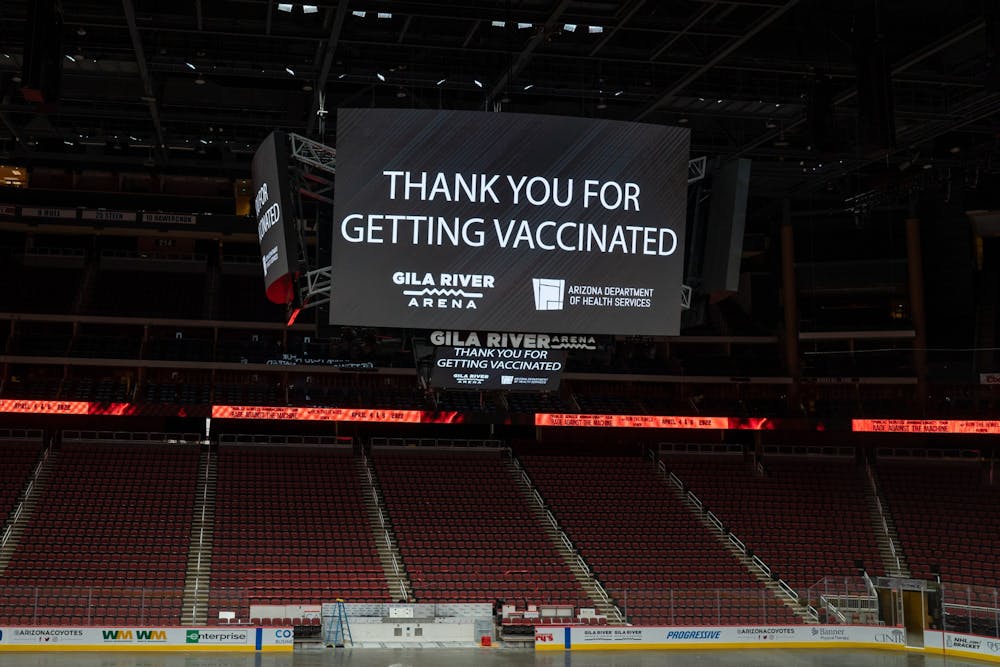You can’t win if you don’t roll up your sleeve.
Throughout the month of July, ASU has been offering prizes for students who upload their COVID-19 vaccine records, part of a University-wide “Summer of Care” effort to encourage students to get vaccinated against the coronavirus.
Since June 28, 150 ASU students have made vaccination appointments, and 5,500 students have uploaded their vaccination records, according to Katie Paquet, an ASU spokesperson.
In total, the University has spent just under $13,000 on two vaccine incentive campaigns. ASU's most recent effort, which spanned from late June through July, cost around $3,900, and a weeklong campaign in May that raffled off bookstore gift cards cost around $9,000, Paquet said.
Vaccination campaigns such as ASU’s is one way to spread the word that vaccines are nothing to be concerned about. The more fun institutions can make it, the better, said Will Humble, executive director of the Arizona Public Health Association.
"It's a way of creating a buzz on campus. It'll get students that are sitting on the fence a reason to go in and get vaccinated," Humble said.
Students who upload their vaccination records to ASU Health Services before 5 p.m. on Friday will have a chance to participate in the last drawing for the July campaign.
Prizes over the course of the month included $250 Visa gift cards, tickets to shows and events at Gammage, packages to watch "In the Heights" in Sun Devil Stadium, Apple products, tickets to the Territorial Cup football game against UA, a holiday-themed photo shoot with Sparky and skateboards.
In the 85281 zip code, where ASU’s Tempe campus is located, only 33.82% of individuals aged 15 to 24, a range consisting of the typical ages of college students, have received one dose of the vaccine, according to a Maricopa County vaccine administration dashboard.
Humble said the key to encouraging younger people to receive the vaccine is convenience and no cost. Areas that offer incentives, like Pima County, have seen a bit more success.
In Pima County, people receiving their first COVID-19 vaccine dose can receive Arizona Lottery $2 scratcher tickets. Pima County also operated "Vax After Dark" sites until May, which were walk-up vaccine sites open at times ranging from 4 p.m. to 9 p.m. around downtown Tucson. The "Vax After Dark" campaign was designed to provide an opportunity for people to get vaccinated after regular work hours in fun locations.
Pima County’s efforts paid off, Humble said.
According to the Arizona Department of Health Services, 48.1% of people in Pima County are vaccinated, compared to 36.6% in Maricopa County.
"Just go look at their vaccination rates. For a younger person, it's a lot better than the rest of the state," Humble said. "That's not just luck, it was because of decisions they made."
Universities across the U.S. are picking up similar ideas to incentivize their students to get vaccinated.
UA is giving every fully vaccinated student who uploads their vaccination records $10 that can be redeemed at student union vendors or bookstores, as well as entering students into drawing for prizes including $500 tuition assistance, $100 for the purchase of books and parking permits.
Among many others, Auburn University is offering scholarships and parking, the University of Nebraska-Lincoln is giving away branded gear, free parking and more, and Louisiana Tech University is raffling off tuition and fees for a full quarter.
Although ASU’s July effort is ending on Friday, the University is planning to continue the campaign into August, Paquet said.
"This is just one of many ways that we can reach students to encourage them to get vaccinated because we know that the vaccine works," Paquet said.
Benjamin Miller, a senior studying mechanical engineering, however, said there aren't many other routes ASU can take to encourage students to get vaccinated against COVID-19.
He said ASU "really lost some arrows in their quiver" with the executive order Gov. Doug Ducey issued on June 15, which banned higher education institutions from requiring students to vaccinate, upload their vaccine records, wear masks or participate in mandatory testing.
With the order, the University can only go as far as encouraging students to get the vaccine, and Miller said he thinks that will only impact students that do not have strong feelings about getting the shot.
"(The University's) idea here is to move the needle on people who are more apathetic, versus the people who are against a vaccine," Miller said. "Because if you were against the vaccine, clearly, it's not going to change your mind."
Humble said that even if incentive programs like ASU’s don’t make a huge difference, everyone is obligated to at least try to encourage vaccinations with the resources they have.
The University "missed a huge opportunity by (not) building vaccines into the Student Code of Conduct, not to exclude students that were unvaccinated, but to make it a pain in the butt to not be," Humble said. "So (they were) using a carrot and a stick, and now they're just stuck with carrots."
Reach the reporter at alcamp12@asu.edu and follow @Anna_Lee_Camp on Twitter.
Like The State Press on Facebook and follow @statepress on Twitter.
Continue supporting student journalism and donate to The State Press today.




